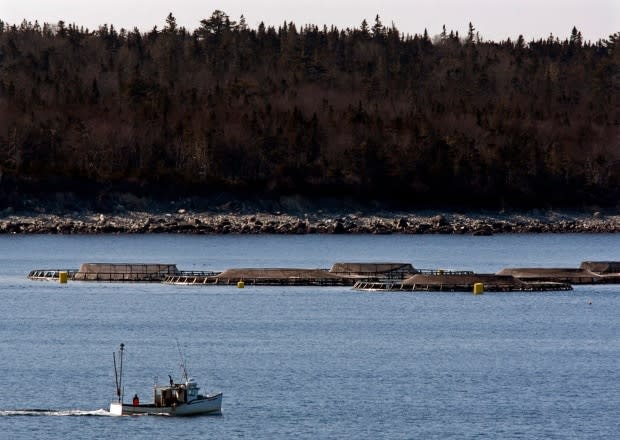'We don't want fish farms here,' says St. Marys Bay lobster fisherman
Some people who live and work on St. Marys Bay in Digby County, N.S., want their local leaders to send a strong message to an aquaculture company that's eyeing the area for salmon farming.
"It's just a no-brainer. No, we don't want fish farms here," lobster fisherman Ritchie Crocker told CBC's Information Morning during an interview from his boat on Tuesday morning.
Crocker, who has fished in the bay for 24 years, is worried about Cermaq's plans to set up open-pen salmon farms as part of a possible expansion into Nova Scotia.
The Digby County location is one of five spots the international seafood company has been granted options to explore by the provincial government.
The company wants to develop sites in Nova Scotia.
In B.C., where Cermaq has some operations, the federal government has given salmon farming companies until 2025 to leave the West Coast. The federal government has control over B.C.'s aquaculture industry, while in Nova Scotia, the provincial government has oversight.
The warden of the District of the Municipality of Digby said while he's aware of community opposition to salmon farming, he's not ready to make a decision. Jimmy McAlpine said his council will meet with Keith Colwell, Nova Scotia's minister of fisheries and aquaculture, to ask for more information.
"We're still trying to be ... educated on whether or not it's sustainable," he said. "If it is sustainable, then I don't know what the problem would be, but it has to be proven that they can provide a sustainable industry."
Company wants to set up 15-20 farms
Cermaq held public information meetings in Digby on Wednesday and will hold several more in the coming weeks after announcing last year that it's looking at a $500-million development in Nova Scotia.
It's looking at sites in Mahone Bay, St. Margarets Bay, St. Marys Bay and sites in Guysborough and Richmond counties.
Linda Sams, director of sustainable development for Cermaq, said the company wants to build a total of 15-20 farms in different locations, but that only about half would operate at any given time.
"It is large, so we're taking our time and very carefully investigating both the feasibility from an environmental perspective, business perspective and probably most importantly from a social perspective," she said.

Crocker said fishermen in St. Marys Bay have several concerns, including the size of the salmon pens and lobster eggs.
"If they fill that site full, the lobster industry here will be depleted because of the lobster [eggs] being eaten," he said.
Crocker also has questions about the pesticides and antibiotics used by aquaculture companies.
Lois Oliver lives in Brighton and said many people in the area already oppose the much smaller Cooke Seafood aquaculture farm that operates in the bay now.
"There are smells and disgusting sights and flotsam that comes from these farms when some of them break apart during nasty weather and rough seas," she said. "And unfortunately, that industry does not have a good track record in picking up after themselves."

Sams said the company wants to do more study in the area "to make sure that our fish feces, our fish pooh ... could be handled by the bay and we can predict where it goes."
She said farmed salmon tend to prefer eating pellets over lobster eggs, and that the industry is using less antibiotics and pesticides than it did in the past.
When it comes to treating farmed salmon for disease, Sams said Cermaq is looking into non-chemical options for conditions like sea lice.
"I understand people's concerns," she said. "We're really open to additional monitoring or making sure that people are very informed about if we ever have a situation where we treat our fish that we can share that information broadly and create assurance for people."
Cermaq's next public meetings are scheduled for Feb. 6 in Saulnierville and Feb. 7 in Sandy Cove.
MORE TOP STORIES


